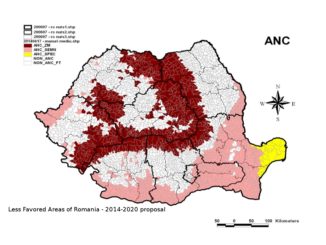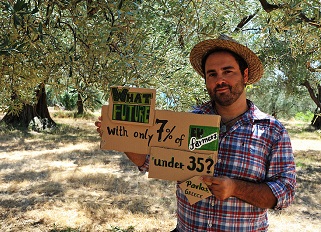
By Oliver Moore 28/05/2021 and updated 01.35 CET 29/05/2021 (please refresh if you’ve visited already!)
Despite a sequence of late night meetings and to-and-fro of proposals covering most of the contentious outstanding areas, the so-called jumbo-trilogues talks have ended without agreement. Parliament and Council failed to reconcile their positions on a number of key areas. The remaining areas include “green architecture” (a number of GAECs, ring-fencing of support for eco-schemes and environmental investments, tracking climate spending, alignment to the Green Deal), internal convergence, the social dimension and coupled income support. Here we present the Parliament’s counterproposal, as the final proposed position as of 2am Friday morning, which was drafted in response to the Council’s position of Thursday evening. The last Parliament offer – which, we must stress, was not an especially strong one from the perspective of small farmers and the environment to begin with – was not accepted and the talks broke down. It is expected that this will be the renewed starting point of the next trilogue in June.
See in full the Council positions as of 27th May 8PM 27 May Council doc
See in full Parliament positions as of 28 May 2AM 2021-05-28_EP_proposal. CAP
Eco-Schemes
Here the Parliament was initially willing to drop from its own position of 30% of the first pillar down to 25% ring fencing for eco-schemes. However the Council came in with a ”floor” of minimum spending of just 18%, “with full flexibility to transfer unused funds above the floor to other decoupled direct payments (within the margins of the maximum unit amounts), also for Member States with payment entitlements”. The Parliament countered by proposing only 22% for year 2023 and 23% for year 2024 in line with the Council’s earlier insistence on a limited “learning period”. This was not accepted by the Council.
GAECS
GAEC 4 – Establishment of buffer strips along water courses
Main issue of contention here is the risk that an entire member state can apply a derogation (EDIT – because of drainage ditches; because the water framework directive doesn’t apply to spraying can take place right next to the channel)
GAEC 7 Minimum soil cover (to avoid bare soil in periods that are most sensitive)
The Parliament is in principle against reopening this GAEC, as it considers this closed. Council had wanted to introduce flexibilities based on ”length and severity of the winter period”.
GAEC 8 Crop rotation in arable land (except for crops growing under water)
As was the case with previous attempts at CAP reform, this issue is proving to be exceptionally controversial and detailed, with a number of considerations being brought into the discussions. The Council is trying to introduce exemptions to full rotation, and allow for one year “rotations” if they have a “secondary crop”, (i.e. catch and cover crops)” and, two-year cycles of a pair of alternating crops, and, most controversially, “crop diversification” to be allowable under this GAEC.
The Parliament position is based on full crop rotation being the most impactful way to break the pest life cycle, thereby making the EU Green Deal targets of pesticide reduction more attainable. It therefore argues against any exemptions here. Crop diversification simply allows for monocultures to grow side by side year-on-year as continuous cropping; secondary crops are covered in GAEC 7; alternation of crops is not a long enough to breaks the pest life cycle.
Extract from the Council position: “If Member States may decide that crop rotation encompasses situations when change of crop happens every other year, or other practices aiming at preserving the soil potential, such as crop diversification, taking into account existing farming systems and the diversity of agro-climatic conditions.”
The Parliament is also arguing against the exemption of 10 hectares arable land the Council is arguing for, proposing instead 5 ha. At 10 hectares 70% of all farmers are exempt, covering 10% of the land. At 5 hectares it would be 5% of the land and 50% of the farmers who are exempt.
Council also reintroduced two other greening era exemptions: one where over 75% arable land is used for grasses/other herbaceous forage/fallow/legumes or a combination, another on landscapes of over 75% permanent grasslands.
The Parliament also wants member states to introduce a “maximum limit of area covered with a single crop to prevent large monocultures”.
A major stumbling block here is considered to be the belligerent of French maize growing interests. Large scale intensive maize growers do not alway use rotations, and claim to not be profitable if rotations are imposed on them.
GAEC 9 Minimum share of agricultural area devoted to non-productive areas or features.
This is another hotly contested GAEC. The context is a 10% target as per the EU Green Deal’s biodiversity strategy. This puts into perspective the micro-differences between positions here, which are half this figure or less. The Council is arguing for just 4% of arable land devoted to non-productive features; the Parliament position is 5%. There is also a 1% difference between the two institutions when related eco-schemes are taken into account. To quote this in full from the Council position:
“Where a farmer commits to devote at least 5% of his/her arable land to non- productive areas and features, including land lying fallow, under an enhanced eco-scheme in accordance with Article 28{5a}, the share to be attributed to compliance with this GAEC shall be limited to 3%.”
Whereas the Parliament argues for 6%, not 5%, in the case where farmers create landscape features through eco-schemes as described above.
This GAEC also sees the revival of another old argument regarding Nitrogen (N) fixing crops and weighting. The Council position arguments for “Minimum share of at least 5% of arable land at farm level if include also catch crops or nitrogen fixing crops, cultivated without the use of plant protection products and fertilizers of which 3% shall be land lying fallow or non-productive features. Member States should use the weighting factor of 0,3 for catch crops”. The Parliament suggests using existing flexibility of Regulation EU 1307/2013 Art. 46 .
In the next trilogue it will be important for the Parliament negotiators to recall the long discussions on weighting of ecological focus areas from the previous CAP reform. Weighting has come into this negotiations late, but was crucial last time. The weighting changed over the previous negotiations to incentivise the least ecological practices. In other words, it was made to be more and more attractive for farmers to simply opt for N fixing crops, and not opt for genuine green, not directly productive, practices. It will be important to watch the small print to see if this weighting changes from 0,3 (less problematic) towards 0,7 or other unacceptably high numbers (check out the links at the end of this article for more on this process in 2013/4/5).
Another crucial point of contention is whether 10% relates to farm level or national level. Interestingly, the Council document does not even include a % for member state level, whereas the Parliament position is for 10%.
Nevertheless there is a strong argument for both member state and farm level having 10% as the target – or, in reality, for 10% to only really be relevant for the farm level. If it is national level, there is a fear that intensive farms will do little by way of landscape features (i.e. biodiversity areas) with extensive regions of the member state compensating for this. The likelihood of this maneuver being operationalised will vary from member state to member state, with intensively farmed and populated regions simply having less space to ‘off-set’ against their intensive farming regions. Nevertheless, the principle of farm level is the point of this GAEC, so keeping an eye on the small print, or farm vs member state level, will be key in the next round of negotiations.
Definitions
The Parliament position is to delete the article on paludiculture.
Targeting of support
Here, already, the Parliament position on redistributive payments is weak. Both the Council and Parliament agree on the following: “Mandatory redistributive payment with 10% of DP, with opt out for MS when duly demonstrated in the CAP strategic plan that the redistributive needs are addressed through other tools, including e.g. capping/degressivity, small farmers”. However, the Council wants to add an “opt out” for “internal convergence” or “existing farm structures”. This the Parliament rejects.
In reality, 10% is already very low, with 30% needed to exempt member states from capping/degressivity. The Commission quotes figures showing the measure only works to shareout funds if its more than 12%.
Internal Convergence
This is a big and controversial topic for farmers – watched more closely than many of the environmental adjustments in GAECS, as it is, in the final analysis, money in the pocket now.
The Council had already moved its position from 75% to 85% convergence by 2026 at the latest. So while it has offered 85% in its document dated 27th May, the Parliament is retaining 100% as its position. Convergence has been ongoing for decades now, since the 1992 MacSharry reforms, a point emphasised by negotiator Peter Jahr in the press conference after the talks broke down. Jahr has been quite strident on this point, stating previously (March 2021) that “I have always said that by the end of this reform we need to have put to an end completely to the MacSharry reform”.
Social Dimension
The Parliament wants this brought in immediately (i.e. 2023) and not 2025 as the Council prefers. Parliament also wants additional information added: “The Annex XX on rules on social conditionality pursuant to article 11a should be enlarged by regulation 492/2011 on Freedom of movement of workers, articles 7 and 8 as well as the directive 2000/78 on the General framework for equal treatment”.
So the Parliament wants additional protections for temporary workers, though in practice all that is being proposed here is the application of existing legislation regarding basic protections of workers rights at member state level. The Council, which it is worth remembering, is made up of national ministers in member states with this legislation already in place – want to delay this and exempt the most vulnerable – temporary workers.
Conclusion
At first glance, it is surprising that the Parliament has indeed held firm on some of these elements. Full convergence and crop rotations are two of the standout examples. Often at this stage in the negotiations, the Council just steamrolls in and demands the money. The fact that national ministers and the presidency are meeting with their agri-lobby counterparts, while, in some cases, the Commission is locked out of meetings, and small farmer organisations are fighting with the police in the streets is a revealing, if standard, part of the power plays and theatrics of CAP reform.
This time however, the more coherent and all encompassing position of the Commission regarding the Green Deal is key. The Parliament is also insisting on retaining Green Deal alignment references. Previously, there was the lone soldier – Ag Commissioner Dacian Ciolos – and a very neo-liberal overall Commission. This time, Timmermans (green deal) and Wojciechowski (agriculture) are to some extent singing from the same hymn sheet. And the Green Deal itself has five Commissioners paying attention and supporting environmental ambition.
Further, the Commission is no longer acting merely as a technical staff, more an overarching EU supranational entity coupled with ‘honest broker’ arbitration. While the Parliament did not have an especially strong position to begin with, and while it may all be grandstanding before yet another CAP-itulation, for now, the game has not gone according to the business-as-usual plan.
Expect, in the month ahead, lots of exasperated talk of the lack of democracy in the fact that national ministers have to co-legislate with the (democratically elected) Parliament. Already the Spanish and Greek ministers have been venting (while trying to re-open what’s been agreed at previous trilogues). And expect environmental NGOs to start asking their national ministers, once back at home, if they are representing agri-industry only? Or if they represent agriculture plus their whole national member state position on climate and environment too. This is after all, what they are supposed to be doing, despite the ag lobby meetings and optics this represents.
It appears, as the hands of the clock have rotated once more, the shade cast by the Green Deal on the agri-industrial lobby, threatens their standalone place in the sun – just a little bit. June is just around the corner…
More on CAP now
Withdraw The CAP Movement Takes on Timmermans, Trilogues and Parliament Plenary
Hidden Formulas and Agri-Media – Can we Find a Fair CAP in Ireland?
Analysis of previous reform’s weighting adjustments in greening
‘CAP-itulation’ – EU Commission gives up further EFA criteria







1 Trackback / Pingback
Comments are closed.